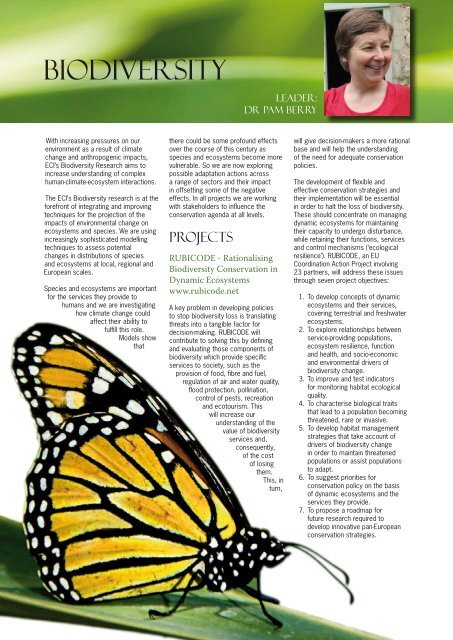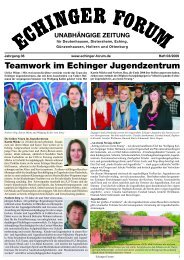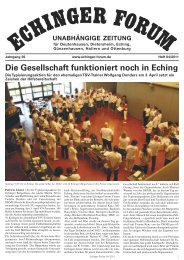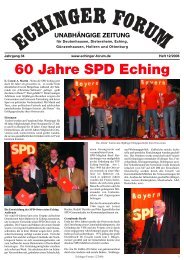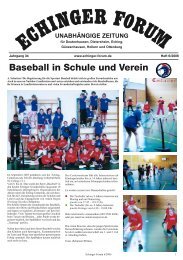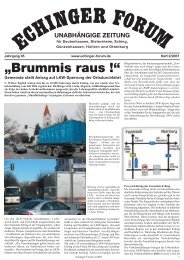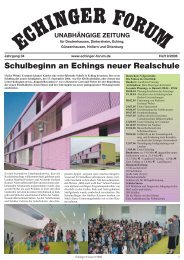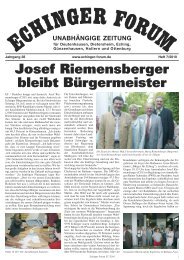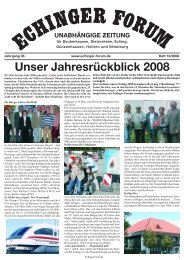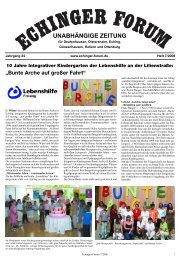Büro Karl Holmer Sachverständiger für Kraftfahrzeuge - Echinger Forum
Büro Karl Holmer Sachverständiger für Kraftfahrzeuge - Echinger Forum
Büro Karl Holmer Sachverständiger für Kraftfahrzeuge - Echinger Forum
Create successful ePaper yourself
Turn your PDF publications into a flip-book with our unique Google optimized e-Paper software.
1<br />
biodiversity<br />
With increasing pressures on our<br />
environment as a result of climate<br />
change and anthropogenic impacts,<br />
ECI’s Biodiversity Research aims to<br />
increase understanding of complex<br />
human-climate-ecosystem interactions.<br />
The ECI’s Biodiversity research is at the<br />
forefront of integrating and improving<br />
techniques for the projection of the<br />
impacts of environmental change on<br />
ecosystems and species. We are using<br />
increasingly sophisticated modelling<br />
techniques to assess potential<br />
changes in distributions of species<br />
and ecosystems at local, regional and<br />
European scales.<br />
Species and ecosystems are important<br />
for the services they provide to<br />
humans and we are investigating<br />
how climate change could<br />
affect their ability to<br />
fulfill this role.<br />
Models show<br />
that<br />
Leader:<br />
Dr Pam Berry<br />
there could be some profound effects<br />
over the course of this century as<br />
species and ecosystems become more<br />
vulnerable. So we are now exploring<br />
possible adaptation actions across<br />
a range of sectors and their impact<br />
in offsetting some of the negative<br />
effects. In all projects we are working<br />
with stakeholders to influence the<br />
conservation agenda at all levels.<br />
Projects<br />
RUBICODE - Rationalising<br />
Biodiversity Conservation in<br />
Dynamic Ecosystems<br />
www.rubicode.net<br />
A key problem in developing policies<br />
to stop biodiversity loss is translating<br />
threats into a tangible factor for<br />
decision-making. RUBICODE will<br />
contribute to solving this by defining<br />
and evaluating those components of<br />
biodiversity which provide specific<br />
services to society, such as the<br />
provision of food, fibre and fuel,<br />
regulation of air and water quality,<br />
flood protection, pollination,<br />
control of pests, recreation<br />
and ecotourism. This<br />
will increase our<br />
understanding of the<br />
value of biodiversity<br />
services and,<br />
consequently,<br />
of the cost<br />
of losing<br />
them.<br />
This, in<br />
turn,<br />
will give decision-makers a more rational<br />
base and will help the understanding<br />
of the need for adequate conservation<br />
policies.<br />
The development of flexible and<br />
effective conservation strategies and<br />
their implementation will be essential<br />
in order to halt the loss of biodiversity.<br />
These should concentrate on managing<br />
dynamic ecosystems for maintaining<br />
their capacity to undergo disturbance,<br />
while retaining their functions, services<br />
and control mechanisms (‘ecological<br />
resilience’). RUBICODE, an EU<br />
Coordination Action Project involving<br />
23 partners, will address these issues<br />
through seven project objectives:<br />
1. To develop concepts of dynamic<br />
ecosystems and their services,<br />
covering terrestrial and freshwater<br />
ecosystems.<br />
2. To explore relationships between<br />
service-providing populations,<br />
ecosystem resilience, function<br />
and health, and socio-economic<br />
and environmental drivers of<br />
biodiversity change.<br />
3. To improve and test indicators<br />
for monitoring habitat ecological<br />
quality.<br />
4. To characterise biological traits<br />
that lead to a population becoming<br />
threatened, rare or invasive.<br />
5. To develop habitat management<br />
strategies that take account of<br />
drivers of biodiversity change<br />
in order to maintain threatened<br />
populations or assist populations<br />
to adapt.<br />
6. To suggest priorities for<br />
conservation policy on the basis<br />
of dynamic ecosystems and the<br />
services they provide.<br />
7.<br />
To propose a roadmap for<br />
future research required to<br />
develop innovative pan-European<br />
conservation strategies.


